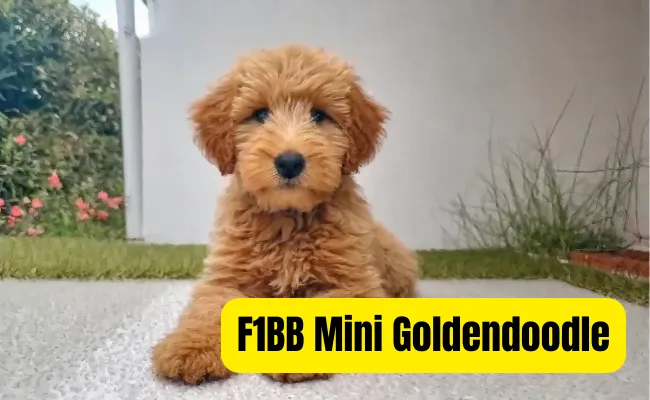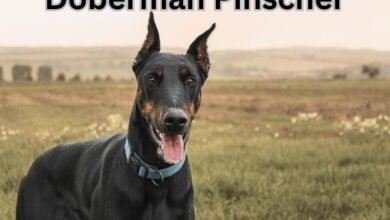
Prepare for a remarkable adventure full of cuddles, joy, and a touch of enchantment unique to the Goldendoodle. The F1BB Mini Goldendoodle is a mixed breed dog that represents a careful blending of an F1B Goldendoodle (which itself is 75% Poodle and 25% Golden Retriever) with a purebred Poodle, resulting in a composition that is significantly Poodle-dominant. This deliberate crossbreeding effort is designed to produce a dog with a low-shedding and hypoallergenic coat, catering to families with allergy concerns.
Additionally, the F1BB Mini Goldendoodle tends to inherit the intelligence and friendly nature of both parent breeds, along with a coat that is more predictable in terms of texture and shedding due to the higher percentage of Poodle genetics. They are known for their sociable, friendly disposition and are suited to a variety of living situations, provided they receive adequate exercise and mental stimulation.
F1BB Mini Goldendoodles: A Simple Guide

F1BB Mini Goldendoodles are special little dogs that show just how amazing careful dog breeding can be. They’re smart, loving, and great for people with allergies. Here’s why they’re so special:
- What’s in the Mix? They have 75% Poodle and 25% Golden Retriever in their genes. This mix brings out the best of both breeds: intelligence and friendliness from the Poodle, and the Golden Retriever’s warmth and robust health.
- What Does F1BB Mean? This label tells us about the dog’s family tree. “F1” means the first mix of a pure Golden Retriever and a pure Poodle. The “BB” tells us this pup is one step further along the family tree, with even more Poodle DNA, thanks to being the child of an F1B Goldendoodle (already a bit more Poodle) and another purebred Poodle. This careful mixing is all about making the most of the Poodle’s non-shedding, allergy-friendly coat and smarts, while keeping the Golden Retriever’s friendly and healthy qualities.
- Why They’re Great: The F1BB Mini Goldendoodle is made to be a smaller, hypoallergenic companion that brings all the joy and friendship a dog can offer. This careful breeding not only aims at creating a dog that looks good and is easy to live with but also keeps the good health and happy nature of its ancestors.
In short, F1BB Mini Goldendoodles are the result of thoughtful breeding to offer the best mix of brains, beauty, and health benefits, making them fantastic pets for a wide range of people.
Table of Contents
- F1BB Mini Goldendoodles: A Simple Guide
- Historical Background
- Physical characteristics
- Temperament and Personality
- Health and Lifespan
- Care and Maintenance
- Adoption and Breeding
- Living Conditions
- Why Choose an F1BB Mini Goldendoodle?
- Considerations for Potential Owners
- Conclusion
F1BB Mini Goldendoodle Overview
| Aspect | Description |
| Breed | F1BB Mini Goldendoodle |
| Genetic Composition | Approximately 87.5% Poodle, 12.5% Golden Retriever |
| Parent Breeds | F1B Mini Goldendoodle and Miniature Poodle |
| Coat Type | Wavy or Curly, Hypoallergenic |
| Size | Small, stand between 12 to 17 inches (30 to 43 cm) |
| Weigh | Anywhere from 15 to 30 pounds (7 to 14 kg) |
| Temperament | Friendly, Playful, Outgoing |
| Popularity | Highly Popular Among Dog Enthusiasts |
| Ideal for | Families, Individuals with Allergies |
| Price | $2,500 to $4,200 USD |
| Lifespan | On average, they can live for 12 to 16 years |
Historical Background
The Goldendoodle, a crossbreed of the Golden Retriever and Poodle, has quickly become a popular dog breed since its creation in the late 20th century. The breed’s history and origin demonstrate the intentional effort to create a dog with the favorable characteristics of both the Golden Retriever and Poodle breeds: the Golden Retriever’s friendly and faithful nature, along with the Poodle’s intelligence and hypoallergenic fur. The initial breeding efforts focused on creating a dog that would be an excellent companion and service animal, specifically for individuals allergic to dog dander.
Originating in the 1990s, the Goldendoodle utilized the concept of hybrid vigor, a longstanding practice in animal breeding to improve specific traits. The breed was created with the specific goal of combining the Poodle’s low-shedding coat to benefit allergy sufferers with the Golden Retriever’s friendly and easygoing nature. The Goldendoodle became appealing to families and individuals looking for a pet that could easily adapt to various lifestyles and living spaces.
The breeding processes of the Goldendoodle breed have improved as the breed itself has developed. The F1BB Mini Goldendoodle is a significant advancement in the breeding process, being two generations beyond the initial Goldendoodle cross. The F1BB breed was developed through a deliberate breeding approach to enhance hypoallergenic traits and control size for owners who prefer smaller dogs. Breeders created the F1BB generation by mating an F1B Goldendoodle with a purebred Poodle, resulting in a genetic contribution of 75% Poodle. This enhanced the hypoallergenic properties and established a more consistent set of physical and temperamental traits.
The F1BB Mini Goldendoodle has arisen to meet the increasing need for dogs that can adapt well to different living conditions, such as urban settings with limited space, and for individuals or families with allergies. The breed’s evolution mirrors a general shift in dog breeding towards producing pets that serve as companions while also meeting the specific health and lifestyle requirements of their owners. The F1BB Mini Goldendoodle exemplifies the trend of breed innovation and adaptation.
Physical characteristics

F1BB Mini Goldendoodles are a fascinating and adorable blend in the world of designer dogs, with a distinct set of genetics influenced primarily by their Poodle heritage. Understanding their physical characteristics necessitates an investigation into their genetic makeup. The “F1BB” designation refers to a specific breeding generation: an F1B Goldendoodle (which is already 75% Poodle and 25% Golden Retriever) bred back (with the additional “B”) to a purebred Poodle, resulting in an F1BB Mini Goldendoodle that is approximately 87.5% Poodle and 12.5% Golden Retriever. This significant Poodle influence is important for understanding their size, coat types, and color variations.
Size
The “Mini” in their name clearly indicates their size. Mini Goldendoodles are bred from smaller Poodle varieties, usually Miniature or toy Poodles, which has a significant impact on their size. An F1BB Mini Goldendoodle typically weighs 15 to 30 pounds and stands 13 to 20 inches tall at the shoulder, though sizes may vary slightly depending on the Poodle genetics in their lineage.
Coat Types
The coat of an F1BB Mini Goldendoodle is predominantly influenced by the Poodle’s genetics, resulting in three main types: curly, wavy, and, less commonly, straight.
- Curly Coats are tight and closely resemble that of a purebred Poodle. This coat type is highly sought after for its low-shedding qualities, making it a great option for allergy sufferers.
- Wavy Coats blend characteristics from both the Poodle and the Golden Retriever, offering a soft, slightly looser curl that captures the hearts of many with its plush, teddy bear-like appearance.
- Straight Coats are the rarest in F1BB Mini Goldendoodles due to the strong Poodle genetics. When present, they provide a slightly wavy to almost straight appearance, reminiscent of the Golden Retriever’s coat but with a bit more texture.
Color Variations
The color palette of F1BB Mini Goldendoodles is diverse, ranging from cream, gold, and red, which reflect the Golden Retriever’s hues, to the blacks, grays, and apricots more commonly associated with Poodles. This color diversity is a direct result of the Poodle lineage’s rich genetic tapestry, which can produce a stunning array of colors not commonly seen in purebred Golden retrievers.
Influence of Poodle Genetics
The predominance of Poodle genetics in F1BB Mini Goldendoodles influences not only their physical characteristics but also their hypoallergenic qualities. Poodles are known for their low-shedding coats, which result in less dander, a common allergen. This trait is highly desirable and is frequently a major reason why people and families choose an F1BB Mini Goldendoodle. Furthermore, the Poodle’s intelligence and trainability, combined with the Golden Retriever’s friendly and loyal nature, produce a companion who is not only physically appealing but also extremely sociable and adaptable.
Temperament and Personality
F1BB Mini Goldendoodles are well-known not only for their attractive physical characteristics but also for their delightful temperament and personality, making them ideal companions for a variety of households. Their genetic makeup, primarily influenced by their Poodle and Golden Retriever lineages, has a significant impact on these traits.
F1BB Mini Goldendoodles have a high intelligence inherited from the Poodle, known for their sharp wit and trainability, and the Golden Retriever, known for their eagerness to please and problem-solving abilities. This combination produces a dog that is not only quick to learn but also enjoys the process of learning, making them extremely trainable. They respond well to positive reinforcement techniques like treats, praise, and play, making them suitable for a variety of tasks such as obedience, agility, and even therapeutic work.
Friendliness
F1BB Mini Goldendoodles are known for their friendly nature. They typically inherit the warm and outgoing nature of the Golden Retriever, as well as the sociable and loving temperament of the Poodle. This makes them especially good at developing strong, affectionate bonds with their family members. They are known for their gentle demeanor, which, when properly socialized, extends to new people and situations, making them ideal companions in social settings and family gatherings.
Suitability for Family Pets
F1BB Mini Goldendoodles make great family pets due to their adaptability. They thrive in environments where they can participate in daily activities and enjoy the company of their human companions. Their small size makes them ideal for apartment living and homes with larger outdoor spaces, as long as they get enough exercise and mental stimulation.
Social Behavior with Children and Other Pets
F1BB Mini Goldendoodles have a gentle and patient demeanor toward children, making them ideal companions for families with children of all ages. Their playful nature and high energy levels make them excellent playmates, allowing them to participate in games and activities while remaining mindful of their size and strength.
When it comes to other pets, F1BB Mini Goldendoodles are typically very accepting and can get along well with both dogs and cats, especially if introduced properly and early in life. Their social nature compels them to seek companionship, and they frequently enjoy having another pet in the house to interact with.
Individual temperaments, like those of any other breed, can vary, and early socialization is essential for fostering positive interactions with both humans and animals. Exposing them to a diverse range of people, pets, and environments at a young age can help them develop into well-adjusted adults.
Health and Lifespan
F1BB Mini Goldendoodles are a popular hybrid dog breed that is known for its intelligence, friendly demeanor, and low-shedding coats, making them ideal for families and allergy sufferers. Understanding the health, lifespan, and factors that can affect the well-being of these delightful pets is critical for any potential or current owner.
Genetic Health Conditions
F1BB Mini Goldendoodles are third-generation crosses, which means they have more Poodle genetics (around 87.5% Poodle and 12.5% Golden Retriever). This genetic makeup determines not only their size and coat type, but also their susceptibility to certain health conditions.
From the Poodle Line:
- Hip Dysplasia: Though more commonly associated with larger dog breeds, Mini Goldendoodles can inherit this condition, where the hip joint does not fit into the hip socket properly, leading to arthritis and pain.
- Progressive Retinal Atrophy (PRA): A group of genetic diseases that cause the retina’s gradual deterioration, leading to blindness.
- Von Willebrand’s Disease: A blood disorder that affects the clotting process, leading to excessive bleeding even from minor injuries.
From the Golden Retriever Line:
- Cancer: Golden Retrievers have a higher predisposition to cancer, and although the Mini Goldendoodle has less Golden Retriever genetics, there’s still a risk.
- Heart Conditions: Including subvalvular aortic stenosis, a condition where the heart’s aortic valve is narrowed, affecting blood flow.
Expected Lifespan and Influencing Factors
F1BB Mini Goldendoodles typically enjoy a lifespan of 10 to 15 years. Several factors can influence their health and longevity, including genetics, diet, exercise, and preventive care.
- Genetics: Understanding the health history of their parents can provide insight into potential genetic health risks.
- Diet: A balanced diet suitable for their size, age, and activity level is crucial. High-quality dog food can help prevent obesity and diseases like diabetes.
- Exercise: Regular physical activity is essential for maintaining a healthy weight and supporting cardiovascular health. It also helps with mental stimulation, reducing the risk of behavioral issues.
- Preventive Care: Regular veterinary check-ups, vaccinations, and parasite control play a significant role in preventing diseases and identifying health issues early.
- Mental Health: Mental stimulation and social interaction contribute to overall well-being, reducing stress and anxiety.
Care and Maintenance
F1BB Mini Goldendoodles are a popular hybrid dog breed that is known for its intelligence, friendly demeanor, and low-shedding coats, making them ideal for families and allergy sufferers. Understanding the health, lifespan, and factors that can affect the well-being of these delightful pets is critical for any potential or current owner.
Training and Socialization
Training and socialization are essential for raising a well-adjusted, obedient, and happy F1BB Mini Goldendoodle. Because of their intelligence and eagerness to please, which are inherited from both the Poodle and Golden Retriever lines, these dogs respond exceptionally well to early training and socialization efforts. Let’s look at the best ways to train and socialize your F1BB Mini Goldendoodle.
Importance of Early Training and Socialization
- Early Training: Beginning training at a young age helps establish good behaviors and prevent undesirable ones from forming. F1BB Mini Goldendoodles, with their sharp intellect and desire to please, can start learning basic commands as early as 8 weeks old. Early training sets the foundation for a well-behaved adult dog.
- Socialization: Exposing your puppy to a variety of people, animals, environments, and experiences is crucial during their critical socialization period (up to about 16 weeks of age). Proper socialization helps prevent fearfulness and aggression, ensuring your dog is well-adjusted and comfortable in various situations.
Suggested Training Methods
- Positive Reinforcement: This method involves rewarding desired behaviors with treats, praise, or play, encouraging the dog to repeat those behaviors. Given the F1BB Mini Goldendoodle’s sensitivity and eagerness to please, positive reinforcement is highly effective and strengthens the bond between you and your pet.
- Consistency: Consistent commands, rewards, and corrections are key. Everyone in the household should use the same commands and rules to avoid confusing the dog.
- Short, Engaging Sessions: Keep training sessions short (5-10 minutes for puppies) to maintain their attention. You can have multiple short sessions throughout the day.
Activities and Advanced Training
- Agility Training: This is a fun and challenging activity that plays to the F1BB Mini Goldendoodle’s strengths. It not only provides physical exercise but also mental stimulation. Agility training strengthens obedience, improves coordination, and fosters a deeper bond between dog and owner.
- Obedience Classes: Group classes offer the dual benefits of advanced training and socialization with other dogs and people. They can be especially beneficial for reinforcing commands and proper behavior in a controlled, diverse environment.
- Socialization Opportunities: Arrange playdates with other dogs, visit dog-friendly parks, and expose your dog to different environments (e.g., city streets, country settings). Ensure these experiences are positive and non-threatening to build their confidence and sociability.
Adoption and Breeding
Adopting or purchasing an F1BB Mini Goldendoodle is a significant decision that requires careful consideration and research. These dogs are known for their friendly nature, intelligence, and hypoallergenic coats, making them highly sought after. Whether you decide to adopt or purchase from a breeder, it’s important to understand the best practices for finding a healthy and well-socialized dog.
Finding F1BB Mini Goldendoodles
Reputable Breeders:
- Research: Look for breeders who specialize in Goldendoodles, particularly the F1BB generation. Reputable breeders are transparent about their breeding practices and welcome questions about their process, the puppy’s parents, and health clearances.
- Health Screenings: A trustworthy breeder conducts genetic testing and health screenings on the parent dogs to minimize the risk of inherited conditions. Ask for health clearances for conditions like hip dysplasia, eye diseases, and heart conditions.
- Visit: If possible, visit the breeding facility in person. This allows you to observe the living conditions of the dogs, meet the puppy’s parents, and assess the temperament of the dogs.
- Support: Good breeders offer ongoing support and advice for the life of the dog and often require a contract stating that the dog will be returned to them if you’re no longer able to care for it.
Adoption Options:
- Rescue Organizations and Shelters: There are breed-specific rescues for Goldendoodles and Poodles, as well as general animal shelters that might have F1BB Mini Goldendoodles available for adoption. Adopting offers a loving home to a dog in need and is often more affordable than purchasing from a breeder.
- Online Resources: Websites and social media groups dedicated to Goldendoodle rescue and adoption can be valuable resources for finding a dog in need of a home.
The Importance of Health Screenings and Responsible Breeding
Health Screenings:
- Essential for identifying potential genetic diseases and conditions that could affect the dog’s quality of life and longevity. Prospective owners should request proof of health screenings and genetic testing from breeders.
Responsible Breeding Practices:
- Ethical Standards: Responsible breeders follow ethical standards, which include proper health care, socialization, and ensuring that breeding pairs are genetically tested to reduce the risk of inherited health issues.
- Contribution to the Breed: Ethical breeding practices aim to improve the breed’s health, temperament, and quality of life. Breeders should focus on selecting breeding pairs that will produce healthy, well-tempered puppies.
- Transparency: A hallmark of responsible breeding, transparency involves open communication about the breeding process, the health of the parents, and the care and conditions in which the puppies are raised.
Living Conditions
F1BB Mini Goldendoodles are adaptable dogs that can thrive in a variety of living situations, making them suitable for a wide range of families and individuals. Here’s what to consider regarding their living conditions:
- Space Requirements: Despite their relatively small size, F1BB Mini Goldendoodles are active and energetic. They do well in apartments and condos as long as they receive adequate daily exercise. They don’t require large spaces, but they do benefit from having room to play and explore.
- Yard Access: Having access to a yard is a bonus but not a necessity. If you have a yard, ensure it’s securely fenced to provide a safe area for off-leash play. Without a yard, regular walks, visits to the dog park, and indoor play can meet their exercise needs.
- Compatibility with Various Living Situations: They are known for their adaptability, capable of living happily in both urban and rural settings. Their friendly nature and size make them excellent companions for apartment dwellers, while their energy and playfulness are great for homes with yards.
Why Choose an F1BB Mini Goldendoodle?
F1BB Mini Goldendoodles are sought after for several compelling reasons:
- Hypoallergenic Coats: Their predominantly Poodle genetics mean they are more likely to have hypoallergenic coats, making them a good choice for allergy sufferers.
- Temperament: They are known for their friendly, outgoing, and affectionate nature. They generally get along well with children and other pets, making them excellent family dogs.
- Intelligence and Trainability: Inheriting the Poodle’s intelligence and the Golden Retriever’s eagerness to please, they are typically easy to train. This makes them suitable for first-time dog owners willing to invest in training and socialization.
Considerations for Potential Owners
Before deciding on an F1BB Mini Goldendoodle, potential owners should consider:
- Lifestyle Compatibility: Ensure your lifestyle can accommodate the exercise, mental stimulation, and companionship needs of this breed. They thrive on interaction and may not be suitable for individuals away from home for long periods.
- Commitment to Grooming: Their coats require regular maintenance, including daily brushing and professional grooming every 6-8 weeks to prevent matting and maintain skin health.
- Health Considerations: Be prepared for the responsibility of managing their health, including regular veterinary check-ups, maintaining a healthy diet, and addressing any breed-specific health concerns.
Conclusion
An F1BB Mini Goldendoodle can bring immense joy and companionship to the right family or individual. Their adaptable nature, friendly disposition, and manageable size make them a desirable choice for a wide range of living situations and lifestyles. However, responsible pet ownership is key. Prospective owners should educate themselves about the breed’s needs, including their grooming requirements, exercise needs, and health considerations. By fully understanding what it means to welcome an F1BB Mini Goldendoodle into your home, you can ensure a happy, healthy, and rewarding relationship with your furry friend. Remember, the decision to add a Goldendoodle to your family should be made with care and consideration, emphasizing the lifelong commitment to their well-being and happiness.



